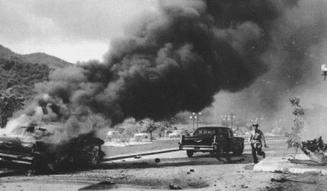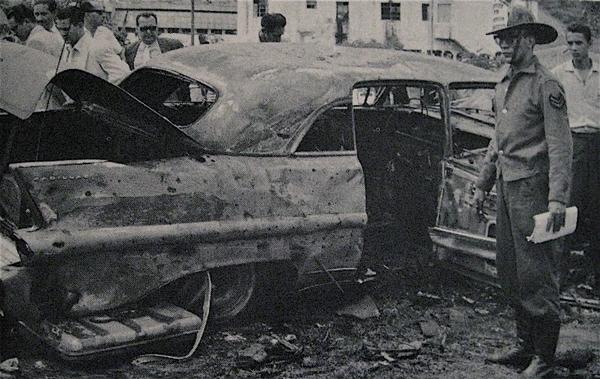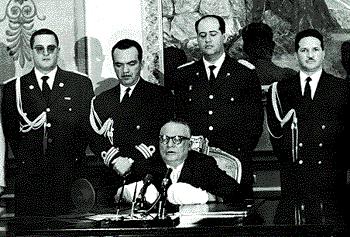In these hard times, we Dominicans need to keep hope, looking for inspiration towards God and those that have participated in acts of bravery in the past. We should be motivated by the recent events in Cuba and the revolution led by Fidel Castro which overthrew the dictator, Batista.
Batista: A Dictator’s Rise to Power
Fulgencio Batista, one of Cuba’s most progressive presidents, was also the most despotic and despised. Batista first asserted his democratic position in the 1930s by ousting General Machado, the recently self-mantled martial dictator. Batista assumed the role of “strongman” behind a spate of figurehead presidents, which culminated in his election to the presidency in 1940. However, Batista only served four years before falling victim to the charisma of politician Ramon Grau. After accepting his defeat and staying in Florida for eight stagnant years, Batista seized a martial dictatorship in Cuba by means of a coup.
Castro and the 26th of July Movement
In 1952, Fidel Castro, a young lawyer and activist, petitioned for the overthrow of Fulgencio Batista, whom he accused of corruption and tyranny. However, Castro's arguments were rejected by the Cuban courts. After deciding that the Batista regime could not be overthrown through legal means, Castro gathered a force of armed rebels, and attacked the Moncada Barracks in Santiago and the barracks in Bayamo on July 26th, 1953. The survivors, including Fidel Castro and his brother Raúl Castro, were captured shortly afterwards. In a highly political trial, Fidel spoke for nearly four hours in his defense, ending with the words; "Condemn me, it does not matter. History will absolve me." Fidel was sentenced to fifteen years in the Presidio Modelo prison, located on Isla de Pinos, while Raúl was sentenced to thirteen years. In 1955, under broad political pressure, the Batista regime freed all political prisoners in Cuba – including the Moncada attackers.
On the Offensive
In a tactical blunder, Batista exiled Castro to Mexico, where Castro was able to rendezvous with his guerrilla forces and plan his next offensive. Castro, along with his brother and revolutionaries such as Ernesto “Che” Guevara, Camilo Cienfuegos, and Alberto Bayo, formed the 26th of July Movement and fomented anti-Batista sentiment among the peasantry. In 1956, the rebels landed secretly on the Cuban beachhead, obscured by the Sierra Maestra Mountains. Batista, aware of Castro’s presence, proceeded to raze adjacent towns in search of Castro, worsening the level of public opposition. In addition to armed resistance, the rebels sought to use propaganda to their advantage. A pirate radio station called Radio Rebelde ("Rebel Radio") was set up in February 1958, allowing Castro and his forces to broadcast their message nationwide within enemy territory, which included the Dominican Republic. The radio broadcasts were made possible by Carlos Franqui, a previous acquaintance of Castro who subsequently became a Cuban exile in Puerto Rico.
Castro’s Victory
Batista proceeded to enact Operation Verano, targeting the encampment of Castro’s guerrilla soldiery. The army sent some 12,000 soldiers, half of them untrained recruits, into the mountains. In a series of small skirmishes, Castro's determined guerrillas defeated the Cuban army. In the Battle of La Plata, which lasted from July 11th to July 21st 1958, Castro's forces defeated an entire battalion, capturing 240 men while losing just three of their own. After his soldiers unofficially capitulated, Batista aborted the operation, which had clearly failed. The chaos that ensued enabled Che Guevara’s bloodless acquisitions of Santa Clara and Santiago. Batista, knowing his presidency was over, fled to Ciudad Trujillo here in the Dominican Republic in the early hours of the new year (1959). The revolution had concluded with Castro’s orchestrated occupation of Havana, where he initiated his resolve to “tear down the old world” and “build up a new.” Castro took over Cuba on January 1st, 1959.
As this new year begins, we urge our fellow Dominicans to take a stand for what they believe in. If Castro could oust Batista, we, as a united nation, can surely oust Trujillo. We the people should not suffer because of the actions of the select few.
United, we will succeed,
United, we will prevail!
Batista: A Dictator’s Rise to Power
Fulgencio Batista, one of Cuba’s most progressive presidents, was also the most despotic and despised. Batista first asserted his democratic position in the 1930s by ousting General Machado, the recently self-mantled martial dictator. Batista assumed the role of “strongman” behind a spate of figurehead presidents, which culminated in his election to the presidency in 1940. However, Batista only served four years before falling victim to the charisma of politician Ramon Grau. After accepting his defeat and staying in Florida for eight stagnant years, Batista seized a martial dictatorship in Cuba by means of a coup.
Castro and the 26th of July Movement
In 1952, Fidel Castro, a young lawyer and activist, petitioned for the overthrow of Fulgencio Batista, whom he accused of corruption and tyranny. However, Castro's arguments were rejected by the Cuban courts. After deciding that the Batista regime could not be overthrown through legal means, Castro gathered a force of armed rebels, and attacked the Moncada Barracks in Santiago and the barracks in Bayamo on July 26th, 1953. The survivors, including Fidel Castro and his brother Raúl Castro, were captured shortly afterwards. In a highly political trial, Fidel spoke for nearly four hours in his defense, ending with the words; "Condemn me, it does not matter. History will absolve me." Fidel was sentenced to fifteen years in the Presidio Modelo prison, located on Isla de Pinos, while Raúl was sentenced to thirteen years. In 1955, under broad political pressure, the Batista regime freed all political prisoners in Cuba – including the Moncada attackers.
On the Offensive
In a tactical blunder, Batista exiled Castro to Mexico, where Castro was able to rendezvous with his guerrilla forces and plan his next offensive. Castro, along with his brother and revolutionaries such as Ernesto “Che” Guevara, Camilo Cienfuegos, and Alberto Bayo, formed the 26th of July Movement and fomented anti-Batista sentiment among the peasantry. In 1956, the rebels landed secretly on the Cuban beachhead, obscured by the Sierra Maestra Mountains. Batista, aware of Castro’s presence, proceeded to raze adjacent towns in search of Castro, worsening the level of public opposition. In addition to armed resistance, the rebels sought to use propaganda to their advantage. A pirate radio station called Radio Rebelde ("Rebel Radio") was set up in February 1958, allowing Castro and his forces to broadcast their message nationwide within enemy territory, which included the Dominican Republic. The radio broadcasts were made possible by Carlos Franqui, a previous acquaintance of Castro who subsequently became a Cuban exile in Puerto Rico.
Castro’s Victory
Batista proceeded to enact Operation Verano, targeting the encampment of Castro’s guerrilla soldiery. The army sent some 12,000 soldiers, half of them untrained recruits, into the mountains. In a series of small skirmishes, Castro's determined guerrillas defeated the Cuban army. In the Battle of La Plata, which lasted from July 11th to July 21st 1958, Castro's forces defeated an entire battalion, capturing 240 men while losing just three of their own. After his soldiers unofficially capitulated, Batista aborted the operation, which had clearly failed. The chaos that ensued enabled Che Guevara’s bloodless acquisitions of Santa Clara and Santiago. Batista, knowing his presidency was over, fled to Ciudad Trujillo here in the Dominican Republic in the early hours of the new year (1959). The revolution had concluded with Castro’s orchestrated occupation of Havana, where he initiated his resolve to “tear down the old world” and “build up a new.” Castro took over Cuba on January 1st, 1959.
As this new year begins, we urge our fellow Dominicans to take a stand for what they believe in. If Castro could oust Batista, we, as a united nation, can surely oust Trujillo. We the people should not suffer because of the actions of the select few.
United, we will succeed,
United, we will prevail!



 RSS Feed
RSS Feed